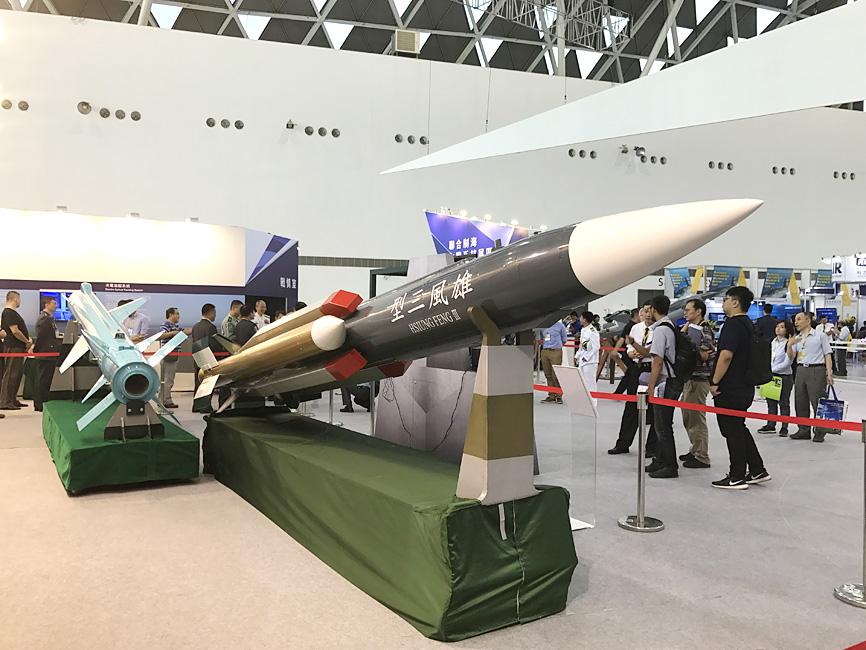The Ministry of National Defense is proposing a special budget totaling NT$200 billion (US$7.14 billion) to boost the Chungshan Institute of Science and Technology’s missile manufacturing capabilities, a source said.
The military hopes that the institute can use the funds to expedite the mass production of missiles with precision and long-range capabilities, the source said, speaking on condition of anonymity.
They said that the budget is in line with President Tsai Ing-wen’s (蔡英文) instructions when visiting the institute in January 2019 to increase production of Tien Kung III (“Sky Bow III”) and Hsiung Feng III (“Brave Wind III”) missiles.

Photo: Hung Chen-hung, Taipei Times
Missiles developed in Taiwan that are fielded by the military have a range of 250km to 600km, including the surface-to-surface Hsiung Feng II-E, the Sky Bow II-B and the Wan Chien air-to-ground cruise missile.
The military uses these missiles to complement its Patriot-III systems and Harpoon anti-ship missiles to provide anti-air and anti-surface capabilities, the source said.
The institute is developing an air-launched version of the mid-range supersonic Hsiung Feng III, a hypersonic missile program that has not yet been named, a Sky Bow III missile with augmented range and a mid-range air-launched cruise missile program under the name Yun Feng, the source said.
There are plans to extend the Hsiung Feng II-E to a range of 1,200km, while the Yun Feng (雲峰) missile is expected to have a range of more than 2,000km, they said.
Institute deputy director Leng Chin-hsu (冷金緒) in March said the institute had one land-based missile ready for mass production and three projects under development.
The institute recently held multiple tests trialing a missile’s maximum or “infinite” altitude, indicating that it might be testing a new missile, the source said.
The land-based missile ready for mass production is the Hsiung Feng II-E missile: the basic version with a range of 600km and the surface-to-surface cruise missile version with a range of 1,000km, they said.

Conflict with Taiwan could leave China with “massive economic disruption, catastrophic military losses, significant social unrest, and devastating sanctions,” a US think tank said in a report released on Monday. The German Marshall Fund released a report titled If China Attacks Taiwan: The Consequences for China of “Minor Conflict” and “Major War” Scenarios. The report details the “massive” economic, military, social and international costs to China in the event of a minor conflict or major war with Taiwan, estimating that the Chinese People’s Liberation Army (PLA) could sustain losses of more than half of its active-duty ground forces, including 100,000 troops. Understanding Chinese

The Ministry of Foreign Affairs (MOFA) yesterday said it is closely monitoring developments in Venezuela, and would continue to cooperate with democratic allies and work together for regional and global security, stability, and prosperity. The remarks came after the US on Saturday launched a series of airstrikes in Venezuela and kidnapped Venezuelan President Nicolas Maduro, who was later flown to New York along with his wife. The pair face US charges related to drug trafficking and alleged cooperation with gangs designated as terrorist organizations. Maduro has denied the allegations. The ministry said that it is closely monitoring the political and economic situation

UNRELENTING: China attempted cyberattacks on Taiwan’s critical infrastructure 2.63 million times per day last year, up from 1.23 million in 2023, the NSB said China’s cyberarmy has long engaged in cyberattacks against Taiwan’s critical infrastructure, employing diverse and evolving tactics, the National Security Bureau (NSB) said yesterday, adding that cyberattacks on critical energy infrastructure last year increased 10-fold compared with the previous year. The NSB yesterday released a report titled Analysis on China’s Cyber Threats to Taiwan’s Critical Infrastructure in 2025, outlining the number of cyberattacks, major tactics and hacker groups. Taiwan’s national intelligence community identified a large number of cybersecurity incidents last year, the bureau said in a statement. China’s cyberarmy last year launched an average of 2.63 million intrusion attempts per day targeting Taiwan’s critical

AGING: As of last month, people aged 65 or older accounted for 20.06 percent of the total population and the number of couples who got married fell by 18,685 from 2024 Taiwan has surpassed South Korea as the country least willing to have children, with an annual crude birthrate of 4.62 per 1,000 people, Ministry of the Interior data showed yesterday. The nation was previously ranked the second-lowest country in terms of total fertility rate, or the average number of children a woman has in her lifetime. However, South Korea’s fertility rate began to recover from 2023, with total fertility rate rising from 0.72 and estimated to reach 0.82 to 0.85 by last year, and the crude birthrate projected at 6.7 per 1,000 people. Japan’s crude birthrate was projected to fall below six,